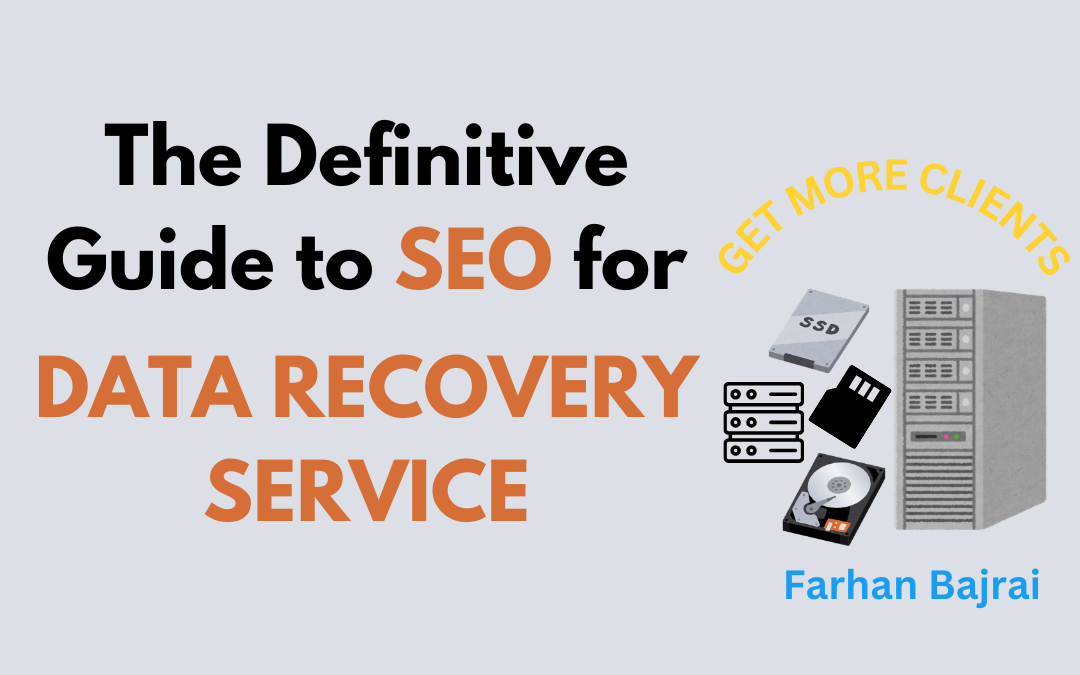How Do You Do SEO for Data Recovery Services?
In this definitive guide, I’ll reveal the SEO tactics top data recovery businesses use to attract new clients from organic search.
You’ll learn:
– Why Every Data Recovery Business Should Use SEO
– How to Do Keyword Research for Data Recovery Services
– The Art and Science of On-Page SEO
– Best Practices for Local SEO
– Local Link Building Techniques That Work
– And much more! Let’s dive in.
Get More Data Recovery Clients with SEO
I help data recovery services dominate their local markets, like Dubai, Abu Dhabi, and Hyderabad using proven SEO strategies.
Understanding the Importance of SEO for Data Recovery Services
With 35,120 monthly searches for data recovery services in the UAE, optimizing your website for search engines is key to tapping into this demand. Creating keyword-driven pages is the foundation for improving your rankings, but you also need to ensure your SEO content is properly optimized for both users and search engines.
.

Understanding the Importance of SEO for Data Recovery Services
Data recovery services are in high demand, with businesses and individuals alike frequently searching for solutions to recover lost data from servers, RAID, NAS, SSDs, mobile devices, and more. Every month, hundreds of potential clients look for experts in data recovery in locations like Dubai.
Whether you’re just starting out or have been in the business for years, a well-executed SEO strategy can significantly boost your visibility and help you capture more leads in your target market.
Why Is SEO Important for Data Recovery Services?
Traditional marketing methods, such as word of mouth and referrals, are always important. However, a strong SEO strategy allows you to have a consistent flow of potential customers—24/7, 365 days a year. And the reason SEO is so effective is simple: intent.
Unlike social media marketing, where you must catch someone’s attention while they scroll, SEO helps you capture clients actively looking for data recovery solutions.
What is Data Recovery SEO?
Data Recovery Search Engine Optimization (SEO) is the process of ranking for relevant keywords that your ideal customers are searching for. The more relevant the keywords, the higher the quality of traffic you will drive to your website. And ultimately, this will lead to more inquiries and conversions.
Google uses over 200 factors to determine what website should rank in search results, which is why many data recovery companies hire SEO experts. However, understanding the process can help you ensure you’re getting the best results from any SEO partner.
Conduct Keyword Research for Data Recovery Services
Keyword research is critical to identify what potential clients are searching for, both in Google Maps (with your Google Business Profile) and Google’s organic results.
Your goal should be to rank in multiple spots on the search engine results pages (SERPs) so you can capture the most traffic. This can include:
– Ranking #1 in Google Ads (which appears above organic results)
– Ranking #1 in the local pack (which appears just below the ads)
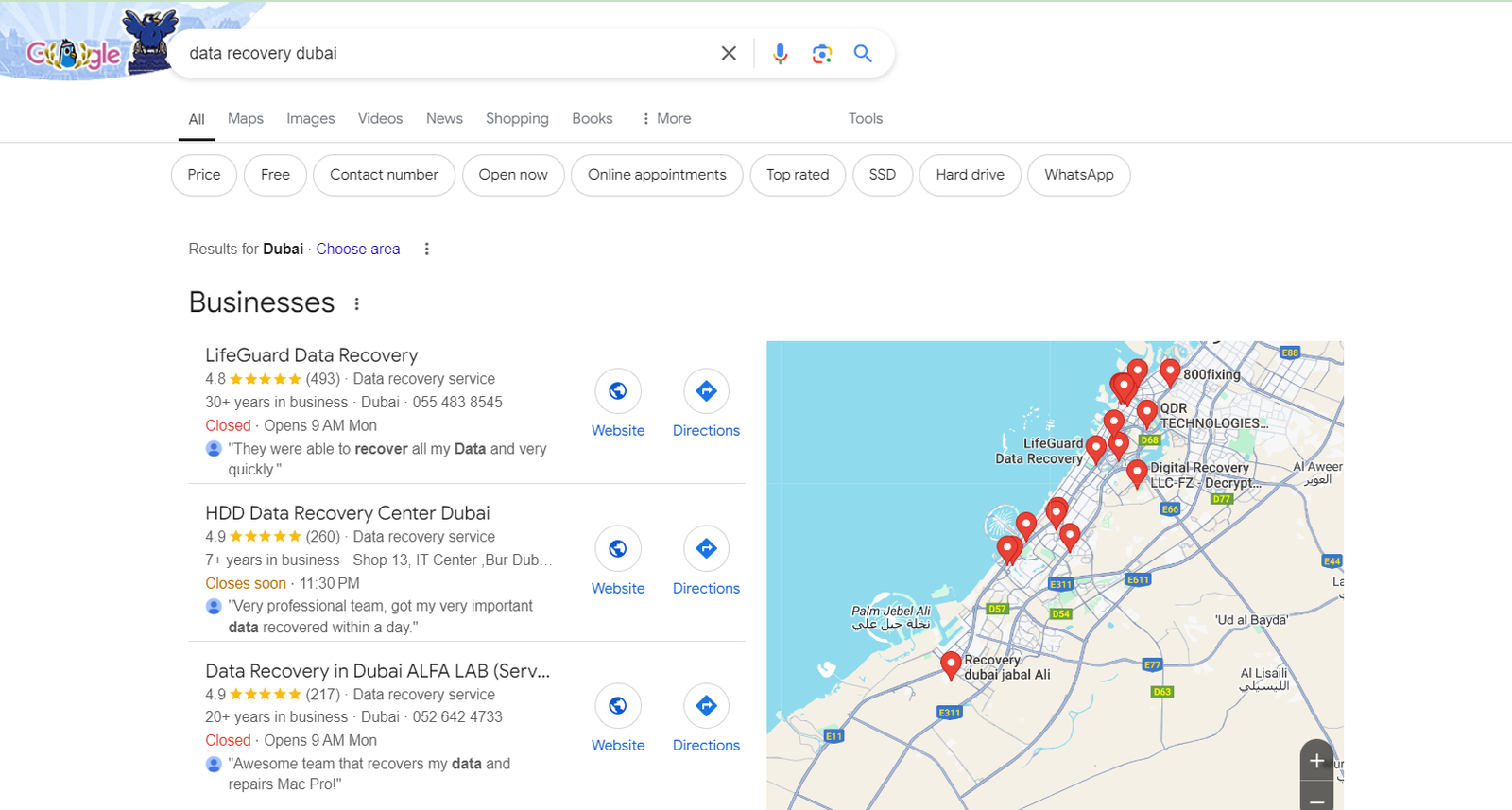
– Ranking #1 in traditional organic search results
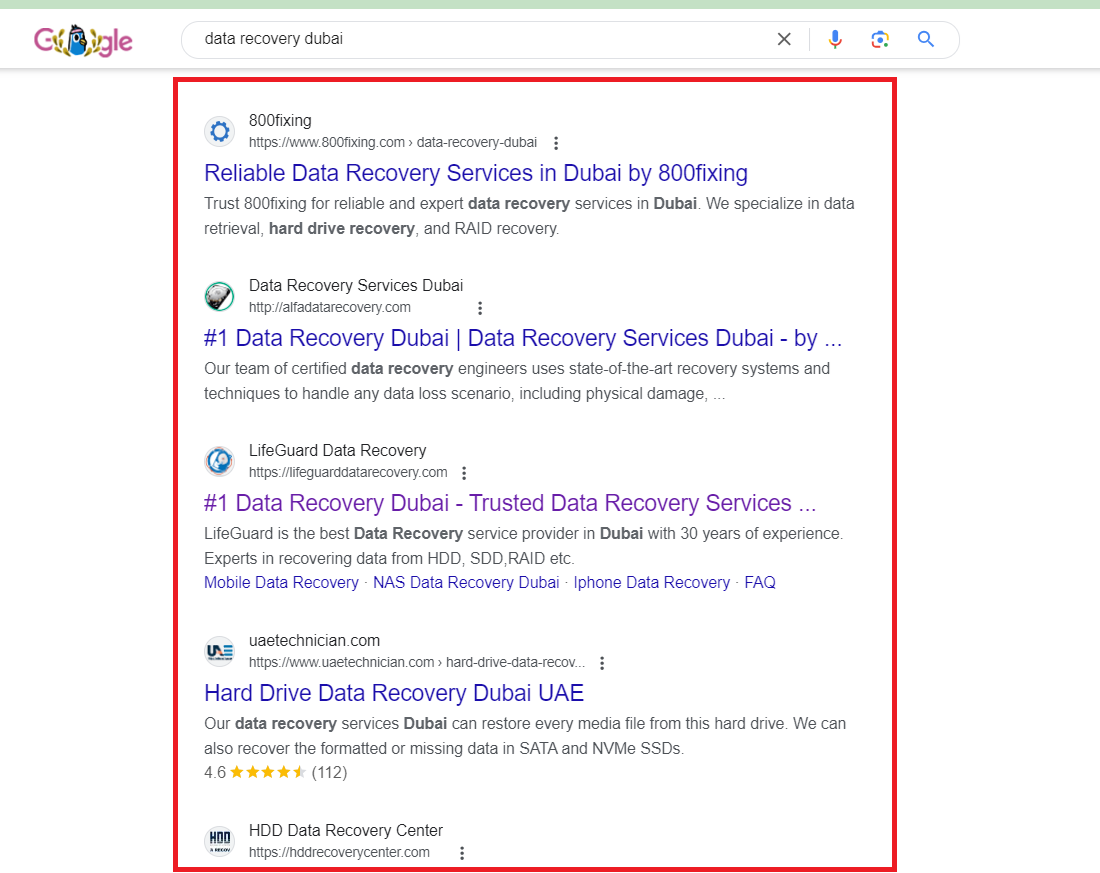
This strategy ensures your data recovery services are front and center for the most relevant search terms.
How to Perform Keyword Research for Data Recovery Services
To get started, it’s essential to use SEO tools like Ahrefs, Ubersuggest or SEMrush to uncover the keywords that potential clients are using to search for data recovery solutions.
For example, if you’re based in Dubai, you can start with broad keywords like “data recovery Dubai” or more specific services like “server data recovery Dubai” or “RAID data recovery Dubai.”
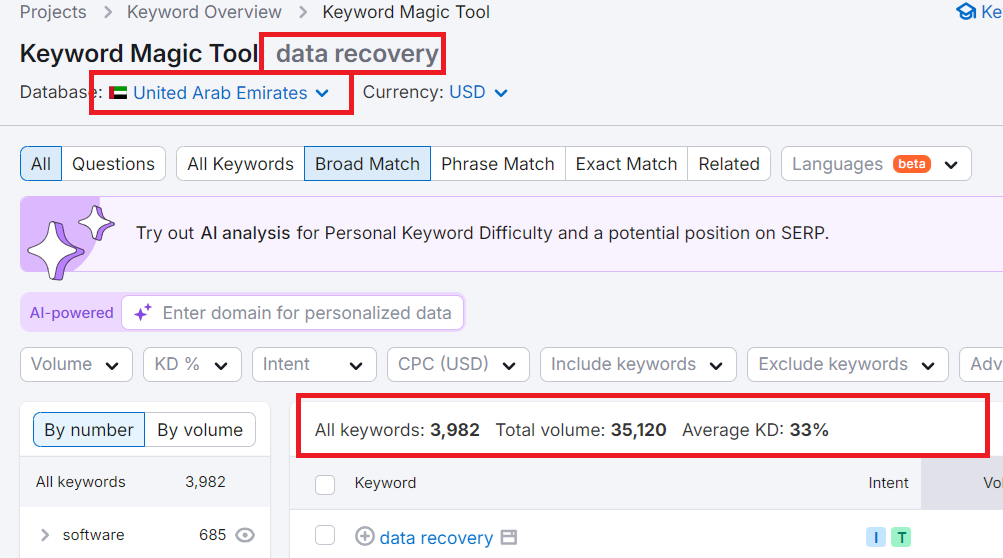
You’ll then build a keyword list that includes various types of data recovery services:
– Server Data Recovery
– RAID Data Recovery
– NAS Data Recovery
– Hard Disk Data Recovery
– SSD Data Recovery
– SD Card Data Recovery
– Pen Drive Data Recovery
– Mobile Data Recovery
– Laptop Data Recovery
– iPhone Data Recovery
Once you have a solid list of keywords, you can focus on creating content that addresses these specific services and locations.
Top Data Recovery Keywords to Rank For
Here’s a quick list of essential keywords for data recovery services to attract local clients in Dubai:
– data recovery Dubai
– server data recovery Dubai
– RAID recovery Dubai
– SSD recovery Dubai
– mobile data recovery Dubai
– hard disk recovery Dubai
– iPhone data recovery Dubai
– laptop data recovery Dubai
– NAS data recovery Dubai
Targeting these keywords ensures you reach potential clients actively looking for data recovery solutions in your area.
Optimize Your Data Recovery Website for SEO
With your keyword list ready, it’s time to optimize your website.
Optimize Your Website Structure
Your website structure is critical for both user experience (UX) and SEO. Ensure that your main services—like RAID, server, NAS, and mobile data recovery—are easy to navigate from the homepage and linked in your primary navigation.
Additionally, your URL structure should be simple and clean. For example:
– www.yourwebsite.com/server-data-recovery-dubai
– www.yourwebsite.com/raid-data-recovery-dubai
Keeping your URLs concise and clear helps both users and search engines understand what each page is about.
reate High-Quality Data Recovery Content
Content plays a vital role in SEO. Whether it’s a service page about HDD recovery or a blog post discussing the importance of RAID data recovery, every piece of content should be optimized for the relevant keywords.
For example, a service page targeting “data recovery Dubai” should include:
– A clear explanation of the service
– Relevant keywords in the title, meta description, H1 tag, and throughout the content
– A call to action for potential clients to contact you
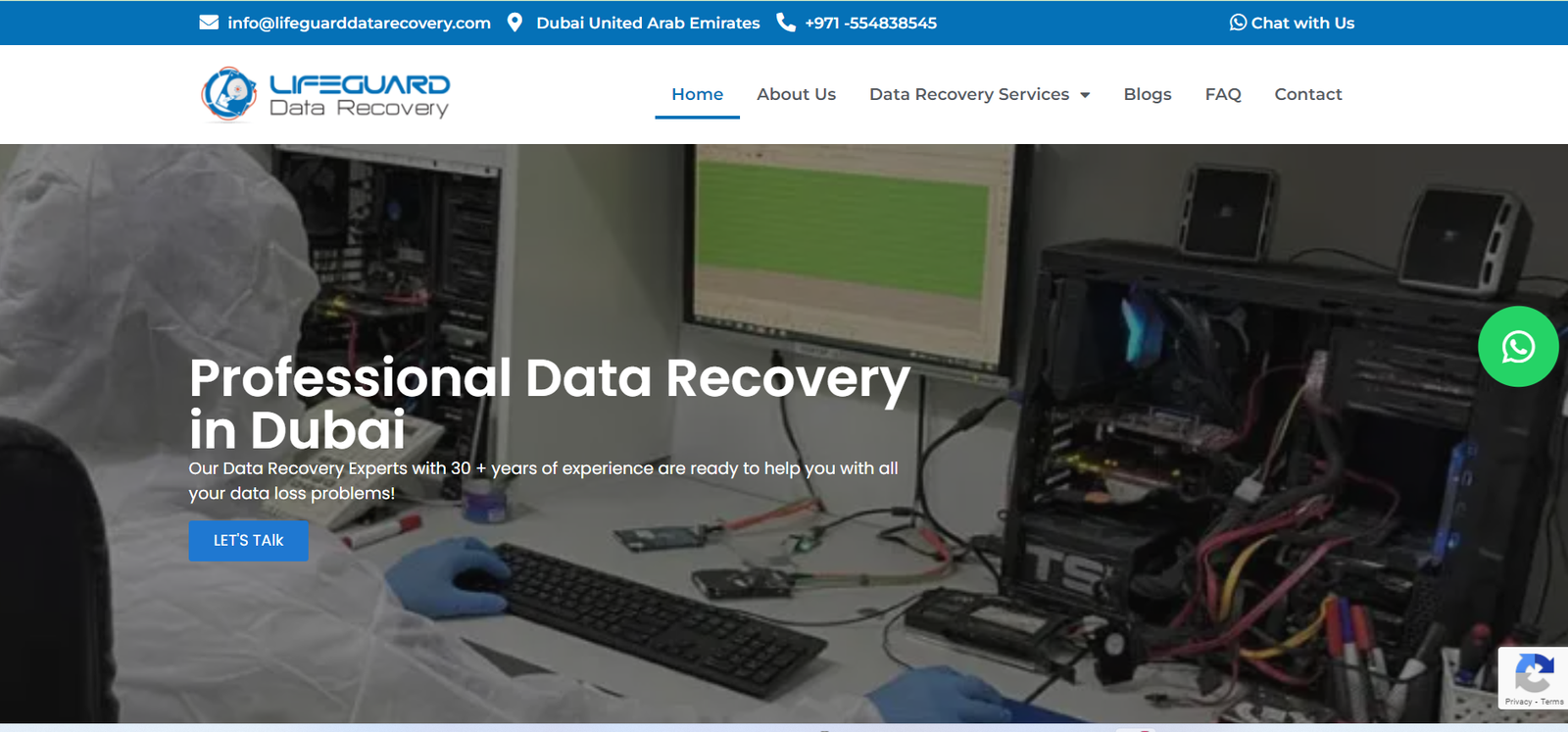
Additionally, blog posts should address common questions potential clients may have. For example:
– “How to Recover Data from a Failed RAID in Dubai”
– “Best Data Recovery Services for iPhones in Dubai”
Related Tip: Use tools like the Detailed Chrome extension to verify if your keywords are in these crucial locations.
Doing these simple on-page SEO steps will set your data recovery website ahead of many competitors in the search engine rankings.
Mobile Optimization for Data Recovery Websites
After perfecting your content, you need to ensure a seamless user experience (UX) across all devices, with particular attention to mobile users. Two important factors that influence UX are mobile responsiveness and loading speed.
Responsive Design
A responsive design ensures that your website is optimized for mobile, tablet, and desktop users. It should also be conversion-focused. Here’s how:
- Place your contact number above the fold (in the header or menu).
- Make sure the phone number is clickable on mobile to increase inquiries.
- Use lead generation forms or clear CTAs above the fold on your service landing pages.
Make it as simple as possible for potential clients to contact you with minimal friction.
Establishing Trust and Authority
When users land on your homepage, they should immediately see that your company has years of experience, a successful track record, and stellar customer reviews. This is especially important for data recovery services, as clients are entrusting you with highly sensitive data.
Make it clear that you’re the trusted experts in data recovery, whether it’s RAID, Server, or SSD data recovery. Highlight case studies, success stories, certifications, and professional affiliations that demonstrate your authority in the industry.
Incorporating Google E-E-A-T (Experience, Expertise, Authoritativeness, and Trustworthiness) principles into your website will further boost your credibility and rankings. Don’t hesitate to show off your technical expertise.
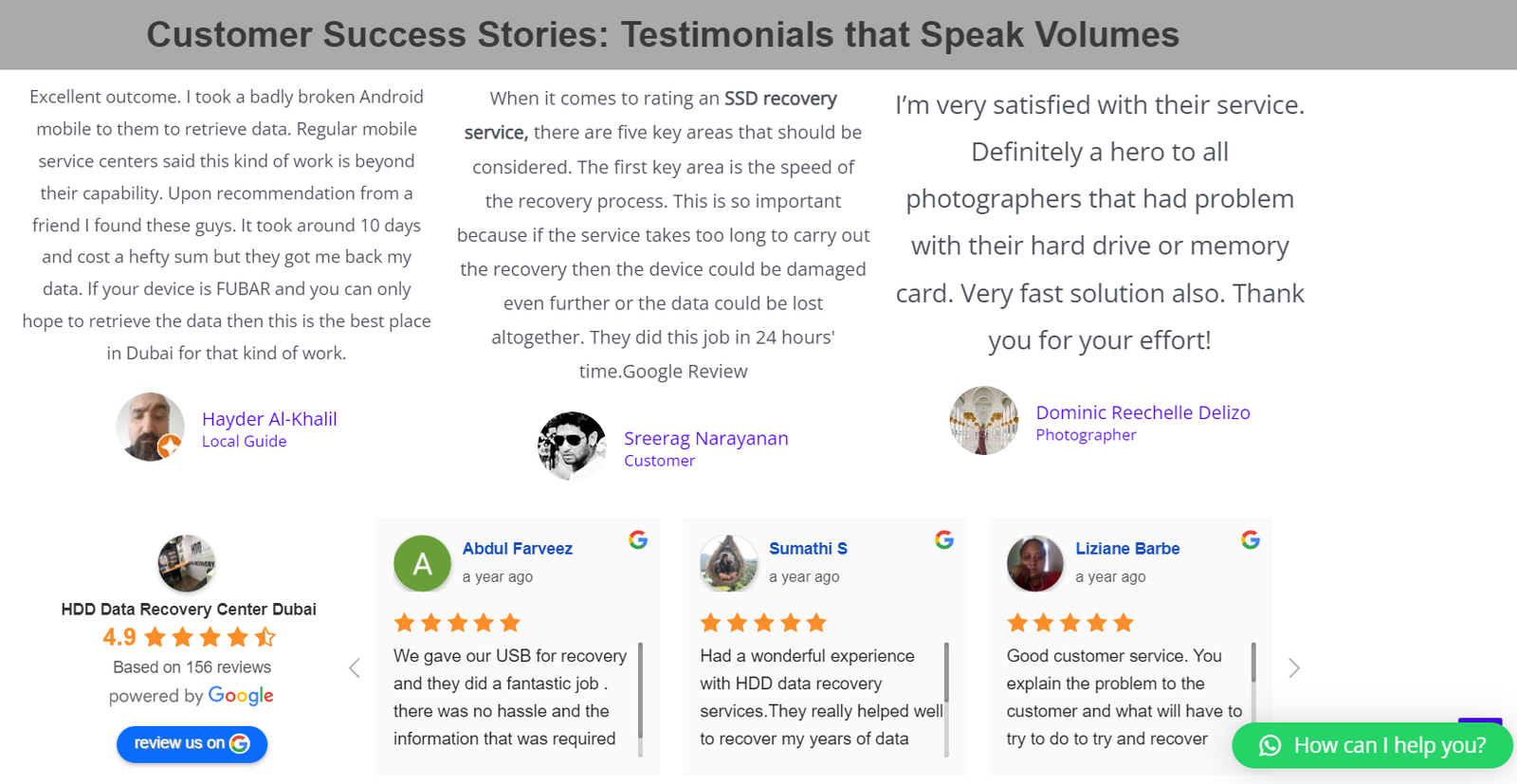
Website Speed Optimization
A fast-loading website is crucial for both user experience and search engine rankings. Use Google PageSpeed Insights to test your website’s loading speed.
If your score is lower than 80, consider it a priority to improve load times. Addressing speed issues not only improves user retention but also signals to search engines that your site is optimized for performance. Most SEO agencies can handle this for you, but it’s worth prioritizing in-house as well.

Don’t Forget About On-Page SEO for Data Recovery Services
Creating keyword-driven pages is essential for improving your search engine rankings. But it’s equally important to ensure that your SEO content is properly optimized. The best time to do this is before creating your content.
On-Page SEO Essentials
Once the content is ready, ensure all the core on-page SEO elements are in place:
- Include the primary keyword in the URL, title tag, meta description, and H1 tag.
- Use a variation of the keyword in at least one H2 tag.
- Ensure the keyword appears in the first sentence of the content.
Local SEO for Data Recovery Services
Local SEO is essential for data recovery businesses. Optimizing for local search means you’ll show up in the Google Maps results, increasing the chances that potential clients in Dubai will find you.
How to Optimize for Local SEO
1. Have a Physical Address in Dubai
Google prioritizes businesses with a physical presence in the location being searched. Ensure that your office address is visible on your website.
2. Create and Optimize Your Google Business Profile
Set up your Google Business Profile (formerly Google My Business) and fill in all the details. Include your service areas, business hours, and categories like “data recovery service.”
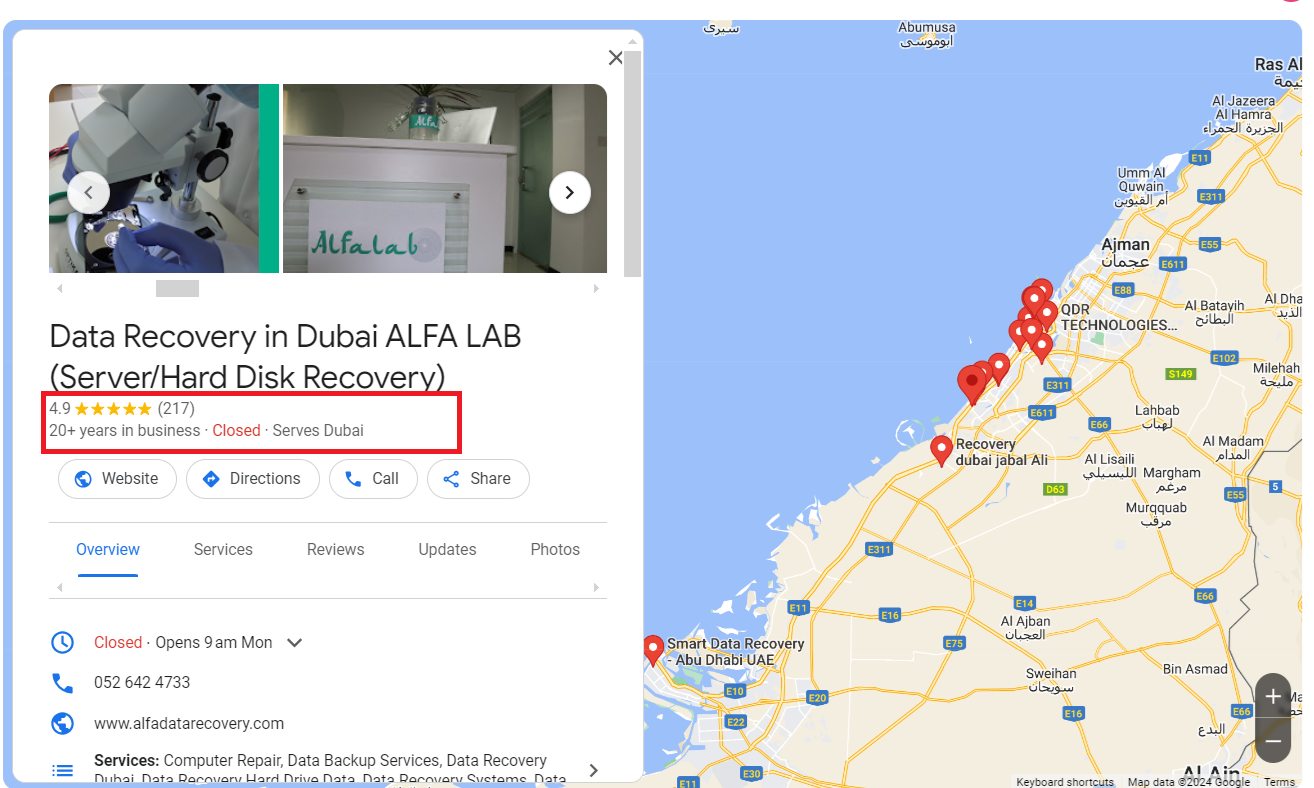
3. Get Client Reviews
Reviews are one of the most significant ranking factors for local SEO. Encourage satisfied clients to leave positive reviews on Google.
4. Optimize Your NAP (Name, Address, Phone)
Make sure your NAP information is consistent across all directories, including local directories and Yellow Pages.
SEO Link Building for Data Recovery Services
Link building is the process of obtaining backlinks from other websites, and it remains one of the most crucial SEO ranking factors. However, it must be approached with caution. Poor or harmful link-building practices can lead to severe penalties from Google, which will drastically affect your search rankings and damage your online presence.
The good news is that you can avoid these risks by following link-building techniques that are safe and effective.
Link Building Strategies for Data Recovery Services
The foundation of any successful and safe link-building strategy is high-quality content. However, your commercial pages (like pricing or service pages) are not typically linkable. To attract links, you need to create valuable assets that other websites will want to link to.
For data recovery services, the best approach is to focus on data-driven resources, case studies, or tools that are helpful to your target audience or industry. For example, you could create content like:
- Data recovery best practices
- Case studies showcasing successful recoveries from complex RAID or server failures
- Free diagnostic tools for evaluating hard drive health
- Guides on preventing data loss in various industries
If you’re struggling to come up with content ideas, try using this ChatGPT prompt: “Give me 10 content marketing ideas for a [TYPE OF DATA RECOVERY SERVICE] in [LOCATION] that can serve as link bait.”
Once you have 3-5 valuable assets, you can begin your link-building process. One effective strategy is what I call the Relevancy Pyramid.
The Relevancy Pyramid
Start by targeting the most relevant link opportunities at the top of the pyramid and gradually move down as needed.
For example, if you’re a data recovery provider in Dubai, your top backlink would be from another data recovery service or tech blog based in Dubai. However, competitors won’t likely link to you, and the pool of highly relevant opportunities may be limited.
In such cases, you can move down the pyramid to seek out industry-related publications, tech review sites, or local business directories that could still provide valuable backlinks. Offering guest posts, interviews, or expert contributions can help open doors to relevant linking opportunities.
SEO Analytics and Reporting for Data Recovery Services
After building links and optimizing content, tracking the performance of your SEO efforts is vital. Setting up or optimizing Google Analytics and creating an SEO dashboard will allow you to track key performance metrics.
Understanding SEO Metrics
There are two main categories of metrics to track in any SEO campaign: leading and lagging indicators.
- Leading metrics: These are within your control, like the number of backlinks acquired or the quantity of SEO content created. These metrics should increase steadily each month.
- Lagging metrics: These are results of your previous efforts, such as website impressions, organic traffic, and phone inquiries generated through your Google Business Profile.
In the case of data recovery services, some of the most relevant lagging metrics include:
- Impressions and clicks from Google Search Console
- Organic traffic through Google Analytics
- On-site conversions (inquiry forms, phone calls)
SEO Services for Data Recovery Providers
When implementing an SEO campaign for your data recovery business, you have two options: go the DIY route or hire a professional SEO service.
What to Look for in a Data Recovery SEO Agency
Many SEO agencies offer services, but how do you choose the right one? Here are some key questions to ask:
- What is your SEO process? SEO requires a multi-faceted approach, including technical SEO, content optimization, keyword research, and link building. If the agency only mentions some of these elements, they may not offer a comprehensive strategy.
- What’s your reporting like? Be cautious of agencies that only mention analytics dashboards without clear reporting on deliverables. A transparent agency will provide detailed reports on both leading and lagging SEO metrics.
- How will we communicate? Consistent communication is critical. Agencies that only offer monthly reports may not prioritize transparency. Make sure your chosen SEO provider values regular communication and provides ongoing insights into the campaign.
How Much Does SEO for Data Recovery Cost?
For a data recovery business in a major metro area (like Dubai or Hyderabad), expect to invest around $1,000 per month in local SEO services. If your company operates in a smaller market, the investment may be lower. For multi-location data recovery services, the investment could be upwards of $2,000 per month.
Conclusion: The Future of SEO for Data Recovery Services
Understanding the SEO process is essential when choosing the right agency for your data recovery business. While you can attempt to handle SEO on your own, much like trying to recover a hard drive without expert tools, the risks and lost opportunities may outweigh the benefits.
Whether you choose the DIY route or hire an expert, investing in a well-executed SEO campaign can pay off significantly by attracting more organic traffic and high-quality leads.

Farhan Bajrai
SEO Expert
Farhan Bajrai is an SEO Expert and Digital Mentor with 3 Years of Experience. He has hands on experience in Data Recovery SEO, as he worked for multiple Data Recovery clients in Dubai, Abu Dhabi, India

